Economic Outlook
 Last week, I asked, “What would make 2018 more productive for you? Please email me the first thing that comes to your mind.” Before I summarize the responses, a big thank you to the 800+ people who sent me personalized responses. Someone pointed out that asking the question itself already helped because it motivated her to review her plans and targets.
Last week, I asked, “What would make 2018 more productive for you? Please email me the first thing that comes to your mind.” Before I summarize the responses, a big thank you to the 800+ people who sent me personalized responses. Someone pointed out that asking the question itself already helped because it motivated her to review her plans and targets.
My question had been intentionally open, and as such, I received feedback on productivity ideas pertaining to both personal and professional life. In some ways, answers were all over the place, including numerous answers that I had no idea were somehow related to productivity. That said, as themes emerged, at times, I could sense some respondents have their productivity initiatives under control with others struggling. I’ll touch on the main themes below.
First off, to the classic definition of productivity. A lot of respondents mentioned they wanted more time:
My first thought was more time – but then I quickly realized that is the wrong answer – as it is not possible – and productivity is “return on time” not time itself
Well, there is no “wrong answer” and, as many indicated in their responses they were half joking about wanting more time in the day and/or week. The biggest time sucker judging by the lashing out by respondents appear to be social media enabled smart phones:
Great question and my answer is cutting back on my “time saving” devices, especially my phone. I’m dealing with teenagers spending too much time on their devices as well so I’m leading by example. I’ve found my productivity is up when I’m not checking it constantly and things are better in our family when we are unplugged.Warmer weather and cutting off social media. I already took the Facebook app off my phone. I’m hoping it helps me use my free time (including my 45-min commute) for reading books and magazines and listening to high-quality podcasts. Everyone putting their phones down! My main thought is more quiet time without interruptions, not any gadget.
To all those that indicated they want to get rid of their iPhone, I have bad news: someone responded he had an old flip phone and still received too many messages. High on the list was email management, with many hoping to receive fewer or more concise emails, less spam and, yes, fewer surveys such as the one I sent. But it’s not just in the INBOX, there is simply too much junk out there:
Making sure my emails don’t manage my day2018 would be more productive for me if I had a better strategy for taming my inbox.One work day without e-mail per weekIf I could get a “”bot”” to answer my email, I’d love it!An EMP attack would make a nice break from email for 2 or 3 yearsA better curating process for the information I consumeI think spending less time online would probably have the largest effect. …the multitude of various channels signaling “hey look here” today — it didn’t use to be like that. It’s getting too distracting even for a guy who’s been exposed to the net for decades.
A thoughtful response explained we are victims of our own success in being more efficient at many daily tasks:
…take business travel: 15 years ago, I called my travel agent and told her that I needed to go to Geneva on a specific date and needed a hotel. She would comply and come up with a complete (probably ridiculously expensive) itinerary. Who is using travel agents any more these days? I can do it myself and better, choose among the best flights etc and the whole package probably is a lot cheaper than a trip arranged by a travel agent.… admin work that used to be done by assistants … now is being done by a more and more limited group of people within an organization. It is more effective …, but ..in spite of digitalization and automation I spend more and more time doing “these admin” things and I have less time doing what I really should be doing: being creative and interact with clients
In that context, and going back to more traditional interpretations of productivity, there were calls to increase focus. There appears to be desperation to cut through the noise when it comes to any type of information:
Focus, Strategy and Discipline. More focused, less distracted…focusing on fewer thingsBe better at doing the important tasks first, instead of the urgentBetter filters to figure out what not to work on, including those areas of such general interest, that we are very unlikely to attain an analytical edge.More disciplined time management (stick to allotted times for meetings etc ). Having more time to think of really deeply about key issues, rather than just coping. Committing to a ‘mental reset’ session at least three times a week (sport, mediation, etc). Having a morning routine and end day routine (first hour, last hour) with no media, technology interference to allow focus The ability to tune out “noise” both societal and in the investment world.The confidence to pay less attention to Washington DC newsRegarding general time management:Give up some of things that I like in order to focus on the things that I love.Uninterrupted long-form blocks of time for reading and thinking. My goal is to read more books and have more patience with myself when working on bigger ideas that may take longer to deliver (and could fail), but will have more impact than a quick effort.Getting Things Done (GTD) philosophy from David Allen’s book of the same name
There were multiple calls for administrative assistants; some included the call for an assistant at home:
An administrative assistant would make my life more productive. A butler, a PA (home and office) and a personal trainer.
While many looked for ways to squeeze more time out of a day:
2018 would be more productive for me if I spent less time in bed.If I could get by with less sleep
Many more pushed in the opposite direction. The “mindfulness” bucket was large. More sleep was explicitly mentioned in many emails as a way to get more productive:
Productivity comes from a healthy brain, every decision comes from it. So cherish your brain and cut the sugars, alcohol and go to bed an hour earlier every day. And don’t forget to exercise.
Talking about health, those with health issues (or knowing someone with health issues), realized that good health is key to productivity; here a selection of the responses:
Getting more sleep and staying healthy. Maintaining good health, in mind, and body.A healthy back.Continue maintaining good healthHealthier life style, (sleep better, eat healthier, exercise and channel positive energy)More trips in the running shoes and more trips to the Gym. Good health equals a clear head and an efficient means to focus on key concise nuggets of information and avoids delays in acting upon that information.Eating healthy foods and taking my vitamins regularly… it increases my energy, which allows me to be more productive. Health! Physical integrated with mental and is circular both ways!
Talking about health, lifestyle is on people’s mind:
A life partner!Finding myselfLoving things as they are would make me more productive in 2018 and beyond. When “bad” things happen, I can resist reality (“This can’t be happening!”) or I can accept that they have occurred and move on from there. When I take the latter path, I have a greater chance of learning how to prevent the “bad thing” in the future. And, even if that’s not possible, I can tackle the mess from a more reasonable perspective (“OK. This happened. Now what can I do?”). I’ve been working on this for decades, but there’s always more to learn. My solution is to focus on being more mindful – living in the momentBeing what I really love!My focus is on other matters such as personal growthHope for more peace than hateInvesting in oneselfMore time for myself, my family and my friendsIf I can become much more consistent about meditation.One small positive thought in the morning can change your whole day I think I should try getting an extra hour of sleep everyday for greater productivity. Currently get 6-7 hours. And some time to goof off.
While health in itself would get people to be more productive, several responded a job in healthcare would do the trick for them. A new job, a new challenge within a firm, a job at all, or more “gigs” for independent contractors were mentioned, with a few asking whether we had any job openings (no, we aren’t hiring, but if you have ideas how you can join us as a revenue rather than cost center, I’m always listening).
The “new job” bucket of responses was closely related to responses that suggested more revenue would increase their productivity; some sought to pursue specific marketing initiatives. And just as some asked me whether we had job openings, some smart cookies pitched their products to me as the appropriate response as to how they can increase their productivity.
For some, an increase in productivity requires an increase in revenue; many need cash for capital expenditures to make that happen. Indeed, many thought they could increase their productivity if they had a higher salary; several if they were able to raise money for a venture. And, of course, some suggest less conventional ways to raise money:
A winning lottery ticket so I could expand my business without debt.
My query went out to people with a variety of backgrounds; notably, my circle of contacts includes many investment professionals, but also many who are not, but for whom investing is on top of their minds (at least when they get an email from me). Staying on the topic of money, many investment professionals indicated they would be more productive if volatility in the markets were to go up and, with it, equity prices were to fall. For those not in the industry, the reason is rather straightforward: investment professionals have a difficult time adding value when indices go up in a straight line. When it came to non-professional investors, several had very specific requests for the performance of what they were invested in, with many requesting the price of gold or silver to go higher. Beyond that, there was significant disagreement. Some want Bitcoin to soar, others want it to crash. And there were also those that wanted equity prices to be higher and volatility to remain low.
Many suggested their productivity would increase if there was less government interference in the markets; this covered the whole spectrum from low interest rates distorting asset prices to outright government interference and alleged manipulation in markets:
What would make 2018 more productive for me would be for the markets to cease being a political tool and return to being a ‘free’ market. Let me know if you see this happening, ever. Otherwise, the markets will remain a … tool of the elite and participants in the Greater Fool School of investing.
In a multitude of ways, people requested to find clarity. There were lots of requests for high quality information, both for general news, but many specifically related to investing:
Improving the quality of my information sources. This means paying for the best research presented in the most intellectually clear, dense format. The free sources tend to be bloated with excess advertisements and coy “come ons” to join their pay service. I can understand that. I can relate to that. But it’s a time swamp that dissipates focus and distracts me from identifying core themes and crafting action plans to take advantage of the operational situation.For me, it’d be a comprehensive single-stop, source for news and analysis. There’s long been a bias in media, but after our most recent presidential election, it’s hard to really get an unbiased and analytical perspective on current events and even business-related news. An understanding of the Federal Reserve’s monetary policy roadmap for 2018.A service that makes specific sector recommendations on a regular basis (perhaps weekly or monthly?), along with brief rationale. I know lots of newsletters offer this, but I don’t trust them. I read a lot of macro analysis, but I have trouble putting it into action.A quarterly chartbook of key market/economic indicators would be helpful. We see lots of these data books but we are always open for another one – particularly one that focuses on the most relevant or key signals for asset allocators like us.More relevant market insightsAny insights you have on inflation, inflation data, or expectations in the coming yearInsight on the yield curve.It would help to be able to listen to your commentaries while driving, as podcasts, instead that having to read them, as I always do.Knowing the 10 best data points the most successful investors use (and how they combine them) to understand the global macro environment.Continued analysis of “if this happens, then do that” with respect to the market. No one can forecast the market but we can be prepared to respond to situations.Effective tail risk hedging.From an investment standpoint, more concise one stop summary of what market or stocks are high recommendationsHaving more all- weather strategies available (lower returns/risk profiles with ability to make money in different markets).
Some are working on or desire investment software:
Better investment technology.A better investment algorithmGetting my current trading systems completely automated and integrated is priority one right now.I’d be more productive if I could get my hands on some investment stochastic modelling software.
Talking about distractions: politics appears to be a major one. If our politicians stopped bickering, many respondents write they would be more productive. Some are genuinely concerned about North Korea and say they are less productive because of it. Some of the juiciest comments I received lashed out at President Trump, arguing that the noise created by his comments are a distraction; that said, as you might imagine, not everyone agrees, and others see their productivity increase through the President’s actions. Either way, please don’t shoot the messenger, I’m merely reporting.
Let’s take a step back and look and answers addressing general office efficiency:Quicker meetings.A limit on the number of meetings that can be scheduled in a week.Thank you for including me in this survey! My 2018 will be more productive as I streamline my onboarding process and clarify expectations with new and old clients.A better way to incorporate new tasks that arise when out of the office into the workflowLess bureaucracy and administration with our group of companies. Easier access to the relevant information and people to reduce the energy and time.For head hunters and lead selling companies to not bother me.I would have to say work on getting rid of unnecessary tasks on my to-do list or consolidating tasks!More efficient onboarding of new client accounts comes to mind first as my firm’s biggest issue. The biggest thing would be my own office. we have an open architecture plan, which is great for … communicating with each other but makes it hard for me to work…Spending more time with clients as a result of improvements in our service platform
Only one person chose what might have been a common answer some years ago: cleaning up his desk.
Learning new skills, or through technology, including:
I’d appreciate better productivity tools and software to help organize my thoughts better. Maybe a new notepadBetter use of technology, it’s always the best way to become more productive.New technology that works togetherIf I trained myself to use the technology I have betterCompleting the automation of the software on which my RIA is based.AI and searchBetter software (and a Bloomberg terminal)Better integration of my software. Access to my CRM via iPhone app.As an RIA, more efficiency from our custodian brokerage firm would help the most. RIAs are very dependent on their custodians and they are very helpful, the investing world evolves quickly and anything they can do to better keep up, helps immensely.Make better use of tech tools like EvernoteAdoption of a new laptop/tablet/device to increase capability of mobile updates and unchain me from my desktop. My request for 2018: Better telecommuting technology. I spend an hour and a half in the car everyday to get to and from work. I can work from home and complete all of my daily tasks from there, but I miss out on the ease of collaborating in person. I would love to be able to FaceTime my colleagues desk phones and to have cost effective video conferencing technology in every conference room.
Better infrastructure:
Better transport infrastructure in greater NYCA shorter commutebetter broadband
That said, more technology for the sake of it isn’t always wanted:
Less technology , not more … … … too clutteredSoftware vendors stop changing their formats/skins. I learn to do things quickly, then they change something and I have to relearn or find a work around.One thing that comes to mind is not having to cope with various web site “improvements.” The less time I have to spend on re-learning how to use a web site, the more time I will have in 2018 for other things.
I should not forget to mention compliance overhead. Given that many of my contacts work in the investment industry, one of the key impediments to their productivity is complying with regulatory overhead – if you haven’t heard of the acronyms used below, consider yourself fortunate:
Less regulation burden frees resources that are very expensive.Less regulation…Dodd Frank, EMIR, now MIFID II have created an enormous drain on resources. No new regulation will allow us to focus on the business once again.More changes in DOL requirements for 401K and IRA etc. accounts-so far small accounts$25m or less are disadvantaged, paperwork for others is too cumbersome and investment guidelines are wrong.Repeal DOLMy 2018 would be more productive if we could reach a final decision/outcome on the “fiduciary rule” for financial advisors (i.e., is it ever going to be fully implemented or not?).Clarity around regulation would increase my productivity.Less compliance documentation requirementsA removal of the barriers that stand between products and buyers to allow all ETF providers to be on equal footingGovernment clarity! More regulatory clarity in our industry, which could include a re-visit to Glass Steagall. It feels like the Wild West again coupled with redundant documentation required by regulations. Glass Steagall might clear the ever rising financial ambiguity in financial regulation by reducing the investment banking money flow to banks with depository accountability, as the gambling in housing etc continues. Regulation only mucks it up, and never clears up or enforces the root bad behavior, but a law dividing the banking industry into depository and investment banks again would reduce overlapping regulation, and give me more time to work with my clients.Less bureaucracy (read: stupid regulations from Mifid II). Less paperwork!Reduction in the overwhelming regulatory oversight from government and it’s trickle down and interpretation at firm level.
Some emphasized working less to achieve more:
Get rid of difficult clients – Get rid of them quickly – Oil and water does not mixA reduction of my work load/stressMore vacationGive up a couple of titles!Less travel!!! More productive for me would be less time spent on business travel.Longer holidays6 hour workdays….it works for the Swede’sTake all my paid leave
I had four respondents reference religion to improve their productivity. And some pushed back altogether, arguing that increasing their productivity is not on their agenda for the year.
Finally, some think big:
A flying carA teleportation deviceHere you are; maybe there’s a suggestion or two in here to make your year more productive. If so, consider sharing this with your friends. In the meantime, follow me on LinkedIn and Twitter.
Axel Merk
President & CIO, Merk Investments
This report was prepared by Merk Investments LLC, and reflects the current opinion of the authors. It is based upon sources and data believed to be accurate and reliable. Merk Investments LLC makes no representation regarding the advisability of investing in the products herein. Opinions and forward-looking statements expressed are subject to change without notice. This information does not constitute investment advice and is not intended as an endorsement of any specific investment. The information contained herein is general in nature and is provided solely for educational and informational purposes. The information provided does not constitute legal, financial or tax advice. You should obtain advice specific to your circumstances from your own legal, financial and tax advisors. Past performance is no guarantee of future results.

 We’ve delved deep again this year in penning our annual list of 10 Outrageous Predictions. As usual, we roam the world and ride roughshod over consensus in sni ng out these supposedly highly unlikely events with underappreciated potential – events that could have tremendous implications if they come to pass. Enjoy!
We’ve delved deep again this year in penning our annual list of 10 Outrageous Predictions. As usual, we roam the world and ride roughshod over consensus in sni ng out these supposedly highly unlikely events with underappreciated potential – events that could have tremendous implications if they come to pass. Enjoy!
For 2018
– Fed loses independence as US Treasury takes charge
– Treasury enacts 2.5% yield cap after massive spike
– Bank of Japan loses control of its monetary policy
– USDJPY rises to 150 and then collapses to 100
– China issues CNY-denominated oil futures contract
– Petro-renminbi surges, USDCNY below 6.0
– Volatility spikes on sudden S&P 500 ‘ ash crash’
– S&P 500 drops 25% in spectacular plunge
– US voters push left in 2018 mid-terms, bonds spike
– US 30-year Treasury yields rip beyond 5%
– ‘Austro-Hungarians’ launch hostile EU takeover
– EURUSD to 1.00 after hitting new highs
– Investors ee Bitcoin as governments strike back
– Bitcoin @ $1,000
– South Africa resurgent after ‘African Spring’
– ZAR gains 30% versus EM currencies
– Tencent topples Apple as market cap king
– Tencent shares gain 100%
– Women take the reins of corporate power
– Female CEOs at more than 60 Fortune 500 companies

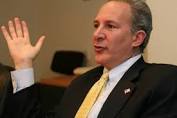 After supposedly chomping on the bit for years to pass meaningful tax reform, Republicans are now set to blow an historic opportunity. Whatever version of the Bill that emerges from the House and Senate Conference Committee (which will be signed by President Trump faster than he can down a Filet o’Fish), will be far less than the Republicans envisioned when they finally captured the White House and both Congressional Chambers in 2016. But from what I have seen of the particulars, the revisions to the tax code will offer a marginal, although temporary, win for low income individuals, a major slap for moderately successful wage earners and home owners, (especially in the high tax Blue States) and a huge victory for the extremely wealthy and certain categories of business owners. While it is certain that the plan will add to the growing deficit, its immediate economic and political impact is hard to predict.
After supposedly chomping on the bit for years to pass meaningful tax reform, Republicans are now set to blow an historic opportunity. Whatever version of the Bill that emerges from the House and Senate Conference Committee (which will be signed by President Trump faster than he can down a Filet o’Fish), will be far less than the Republicans envisioned when they finally captured the White House and both Congressional Chambers in 2016. But from what I have seen of the particulars, the revisions to the tax code will offer a marginal, although temporary, win for low income individuals, a major slap for moderately successful wage earners and home owners, (especially in the high tax Blue States) and a huge victory for the extremely wealthy and certain categories of business owners. While it is certain that the plan will add to the growing deficit, its immediate economic and political impact is hard to predict.
For generations, taxpayers and politicians alike lambasted our overly complex tax code for its myriad of economic distorting loopholes that seemed to produce nothing except employment for legions of accountants and tax lawyers adept at gaming the system. As a result, talk about tax reform has always included proposals to make the system simpler, fairer, and more transparent. But on that front, the Republican proposals fail miserably. Trump and Congress will hail this achievement as being a major victory for the American people. But the true winner will be the swamp that Trump promised to drain.
Unlike Ronald Reagan, who passed tax reform in 1986 by striking a deal with Democrat House Speaker Tip O’Neill, Trump and Congressional Republicans faced no particular need to compromise. If Reagan had the benefits enjoyed by Trump, Ryan and McConnell, his tax cuts would have been paired with significant spending cuts and perhaps a balanced budget. But to get O’Neill (and his whopping 71 seat House majority) to go along, Reagan’s ideals of fiscal prudence and smaller government had to be set aside. But Trump is no Reagan, and today’s Republican Party has about as much commitment to shrinking the size of government as did the Democrats in the 1980s.
Taxes are the price we pay for government. If Republicans want to reduce the tax burden, they need to make government less expensive. Tax cuts without spending cuts is the Republican version of a free lunch. But if government spending is not paid for with tax revenue, alternate sources must be found that will ultimately prove more costly than the forgone tax revenue.
Despite endless campaign rhetoric to the contrary, the Republican Party is no longer the party of limited government, fiscal responsibility, Federalism, the Constitution, sound money, or any of the principals that they typically espouse while stumping for office or raising money. Instead of reducing the size of government, thereby lightening the burden on taxpayers and limiting the economic drag caused by government, Republicans have chosen the easy course of tax cuts, replete with overly optimistic assumptions and gimmicks meant to disguise their true impact on future deficits. Adding insult to injury, they leave in place an even more complex tax code, replete with even more loopholes, that limits individual freedom and undermines economic growth.
True reform would have eliminated the income tax completely, or at a minimum, replaced it with a flat tax. It would have abolished the corporate income tax, payroll taxes, and the estate and gift taxes, and replaced them with a tax system based on consumption rather than production. Such a system would encourage savings rather than debt accumulation, and would restore some semblance of sanity to a system increasingly dependent on borrowing. Real reform would have included entitlement reform, as well as across the board reductions in government spending. Entire agencies and departments would have been eliminated, making government smaller and less expensive. These are the types of changes that are needed to head off a possible looming debt crisis and put the country back on a path to achieve real economic growth, not the phony financial gains we have seen in the past generation.
But instead, Republicans crafted a plan that would cut taxes for some while raising taxes for others. The political genius of the plan can be found in the elimination of state and local tax deductions that will raise taxes predominantly on higher wage earners in Democrat controlled states with high taxes. This move was a political freebie for Republicans, as it largely spares their constituents from tax hikes, but prevents Democrats from protecting theirs because to do so would require them to argue against raising taxes on the “wealthy.” It may also trigger a fiscal crisis in largely Democrat states as high earners, who provide an outsize share of state tax revenue, consider pulling up stakes for lower tax jurisdictions. But Republicans did not leave well enough alone. The taxes raised on rich Democrats will not nearly be enough to pay for the cuts they offer business owners, passive investors, and corporations. The balance will be “paid for” by borrowing. In addition, high tax states may be forced to scramble to adjust their tax policies in an attempt to forestall defections of the wealthy. To do so, they may shift taxes to businesses (for which state taxes will still be deductible from federal taxes). The businesses in turn, can pass these costs onto their employees in the form of lower wages and their customers in the form of higher prices.
Republicans, of course, argue that the economic growth that will be generated by lowering the corporate tax rate from 35% to 20% will generate enough new tax revenue to offset what is lost. While that idea is sound in theory, nothing about our current situation would suggest that a growth surge is around the corner, with or without corporate tax cuts.
We are already in the ninth year of a supposed economic expansion. Over the last century, these expansions (the time between recessions) have lasted, on average, about five and a quarter years. So, already our current “expansion” has lasted nearly twice the average. Also, this expansion has been extraordinarily weak, with growth averaging around 2% since 2009. This is far below the 3% to 4% rate seen in prior recoveries. (data from the National Bureau of Economic Research and Bureau of Labor Statistics) It is also clear that this tepid number has relied heavily on surging asset prices in stocks, real estate, and bonds. But all three of those markets could easily reverse course.
The stock market has surged to all-time highs based on the expected likelihood that tax reform would be passed early in the Trump Administration. When this hope becomes reality, it may be that we will get a “buy the rumor, sell the fact” decline, especially if the final package is not all that investors hoped it would be. The real estate market may actually suffer under the new rules as high-end properties become more expensive to own and less attractive to buy given the limits on property tax and mortgage deductions. On the lower end of the market, the expansion of the standard deduction could mean far fewer will receive a tax benefit from buying modestly priced homes, thereby mitigating the advantages of buying over renting. (It is no accident that some of the biggest objections to the new proposals have come from real estate industry groups). And lastly, the bond market faces no shortage of headwinds. With the Fed threatening to sell much of its $4.5 Trillion holdings of Treasury and Mortgage bonds, the likelihood of falling bond prices and rising yields looms large. (In the past three months, 10-year Treasury yields have increased 30 basis points). Even the tax bill’s supporters acknowledge that it will increase the deficit significantly in the near term, thereby requiring the Treasury to sell more bonds to fill the gap. The extra supply could put downward pressure on bond prices and raise yields on the long end, creating losses in the bond market and raising borrowing costs for government, businesses and consumers.
For these reasons, it is logical to assume that the current tax proposals will have a more modest economic impact than the Tax Cuts of 1986 or even the Bush tax cuts of 2001. It is important to note that the Bush tax cuts occurred while the economy was already in recession, a time where economists could at least plausibly argue that fiscal stimulus was needed. But by putting these cuts through now, while the economy is still expanding (at least on paper), by the time the next recession arrives, the fiscal bullets will have already been fired.
Assuming that the hoped for economic growth does not materialize, the money borrowed now must eventually be repaid. Deficit spending means that today’s tax cuts merely sow the seeds for tomorrow’s tax hikes. But since taxpayers will not only be on the hook for the money borrowed, but the added interest associated with that debt, the future tax hikes could be larger than today’s cuts.
Of course, instead of raising future taxes to repay the money borrowed to fund today’s cuts, a cooperative Federal Reserve could simply print the money needed to buy the additional Treasury debt. But this does not mean we get all this government for free. The cost will come in the form of higher consumer prices as a new round of monetary expansion could cause a continuing drop in the dollar. So Americans may end up with more after tax dollars in their paychecks, but the reduced value of those dollars means they will actually be able to afford to buy less stuff. Just because it appears consumers dodged this bullet during the first three phases of Quantitative Easing does not mean that we will be as lucky with additional rounds.
Best Selling author Peter Schiff is the CEO and Chief Global Strategist of Euro Pacific Capital. His podcasts are available on The Peter Schiff Channel on YouTube.

Since the 2008 financial crisis, there’s been a growing number of ridiculous, inane, and otherwise nonsensical economic interventions from our central bankers that fill the daily economic headlines.
I have gone from the occasional smile to scratching my head now and then to “WTF” moments.
All that said, the economists who designed these interventions had their reasons. They thought lower interest rates and liquidity injections would create jobs, spur investment, and eventually produce inflation.
Then the idea was to reduce the stimulus before inflation got out of control. The problem is that none of these wishes came true.
The Philips Curve That Doesn’t Work Anymore
The key gauge of central bankers for assessing this tricky process is the unemployment rate.
An economy at “full employment” is one in which inflation is right around the corner. The theoretical relationship looks something like this – chart from Gary Shilling.
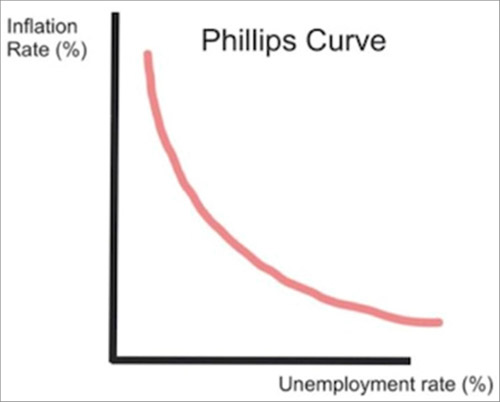
In fact, we now have very low unemployment, accompanied by stubbornly low inflation.
Why is that? No one really knows.
All sorts of theories are floating around, but none have yet proven helpful in restoring the Phillips Curve.
Here’s reality, via Gary Shilling:
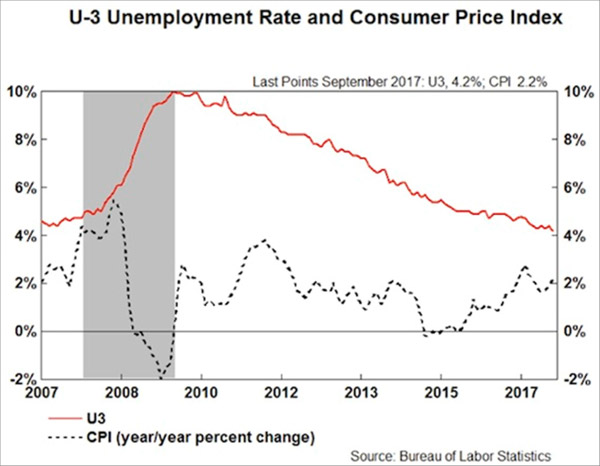
The Median Household Is Back Where It Was in the 1990s
The result is a strange economy in which the people who want jobs mostly have them—but remain deeply dissatisfied, stressed, overleveraged, and often angry. See this graph of real median household income, from my friend Murat Koprulu.
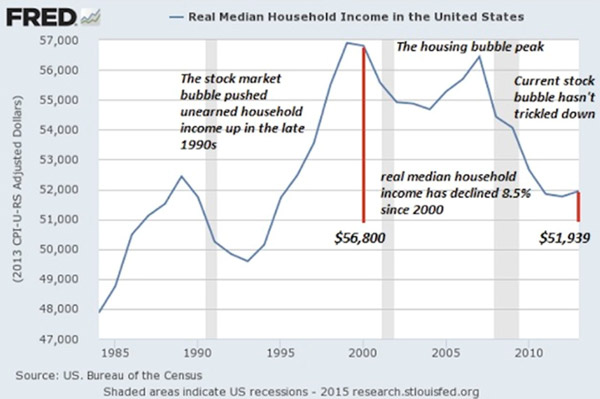
This is median, not average, household income. That means half of households are doing better and half worse. It’s also inflation-adjusted, so the amounts are consistent over time.
We see that the median family is roughly back where it was 20 years ago, in the mid-1990s. Worse, it’s still far below where it was ten years ago before the financial crisis. Is it any wonder people are mad?
Education Has Become a Risk Rather Than an Opportunity
One more absurdity.
In the US, we often think education is the key to getting ahead. That’s not necessarily the case anymore. Here’s another chart Murat sent me, showing real average hourly wages by education level.
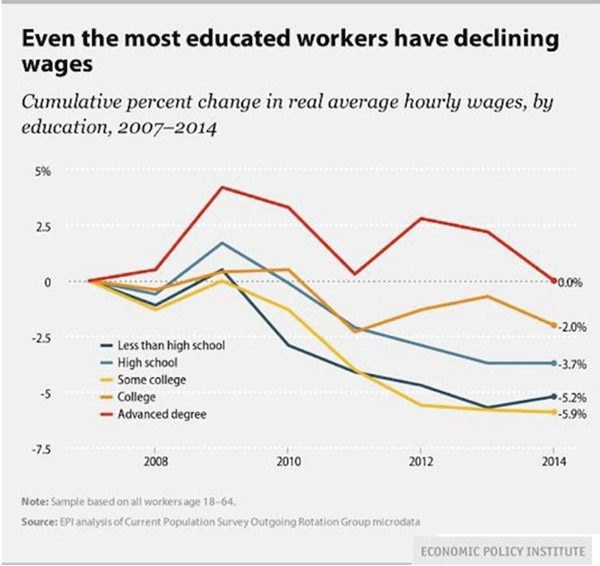
From 2007–2014, possessing an advanced degree enabled you to “get ahead” only in a relative sense. Your wages stayed flat while those of the less-educated fell.
Notice how having “some college” was actually more negative for wages than having only a high school education. How can that be?
Possibly because going to college without obtaining a degree leaves you in debt with less practical experience than your peers who went straight to work after high school.
To that point, student debt is quickly becoming a problem for everyone. Look at this chart from Grant Williams on student loan debt held by the federal government. Do we add that to our national debt?
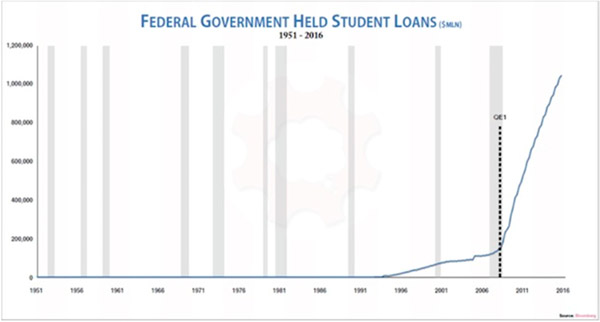
Taxpayers are on the hook for over a trillion dollars in student debt. Unlike mortgage or business debt, student debt is backed by no tangible asset you can repossess. It bought knowledge that now hopefully resides in the student’s brain, but it may have just gone in one ear and out the other.
That makes this debt uniquely risky. You and I are taking that risk, like it or not.
Stock Market Cap Is Near the Dot-Com Peak
And here’s another chart from Grant Williams, showing stock market capitalization to GDP. We are only another healthy bull market run away from being back to dot-com bubble levels. A run that many of my friends firmly believe awaits us.
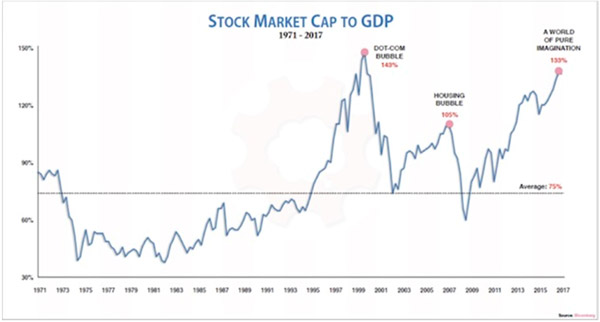
The US stock market as a percentage of GDP is now far bigger than it was at the housing bubble’s peak, and it’s rapidly approaching the dot-com bubble peak. That ought to make us a little nervous as we watch the Dow hit new all-time highs.
Insane Currency Pegs and the Global Market Driven by False Beliefs
And we will close this series of anomalies with a note I got from Louis Gave this morning. Rather than just looking for absurdities in the developed world, Louis’ research team at GaveKal scours the entire world in depth every day.
So he gives us a few lesser-known absurdities. [My comments will be in brackets.]
Usually currency pegs are not a bad place to start when looking for absurdities.
What are the odds of Lebanon keeping its peg now that Saudi won’t bankroll it? After all, you have a pegged currency with current account deficit in double digits relative to GDP:
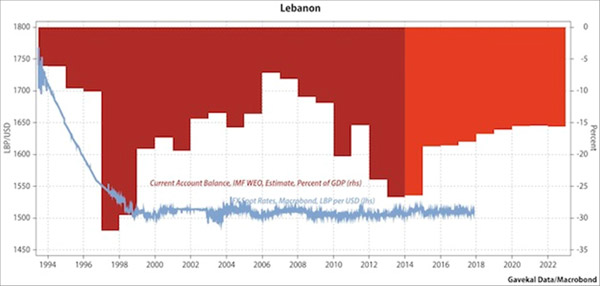
And once the Lebanese peg goes, will it be like Thailand in 1997 with Bahrein, Qatar, Oman, Egypt, Pakistan and ultimately Saudi all following suit?
If so, you can kiss goodbye to those large defense orders…
There are many other ideas. A lot of them linked to the craziness in the bond market (negative swiss yields, Italian junk below UST, etc…). But how about this one:
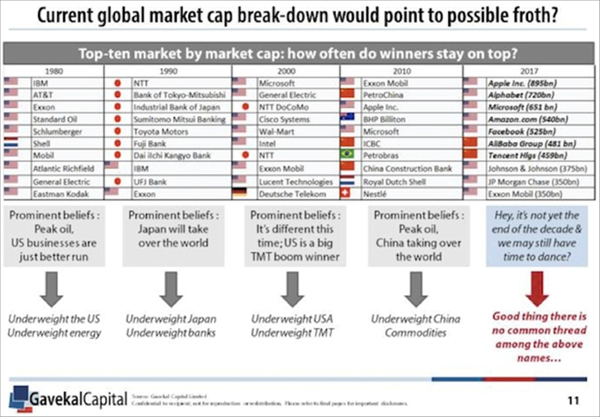
Okay, John back. Please note the serious level of sarcasm in the right-hand column above: “Good thing there is no common thread in the above names…” It’s all tech and all digital in the top seven. Note, however, that Exxon Mobil keeps hanging in there.
The above is why I love Louis and read his analysis every time I get a chance.
Get one of the world’s most widely read investment newsletters… free
Sharp macroeconomic analysis, big market calls, and shrewd predictions are all in a week’s work for visionary thinker and acclaimed financial expert John Mauldin. Since 2001, investors have turned to his Thoughts from the Frontline to be informed about what’s really going on in the economy. Join hundreds of thousands of readers, and get it free in your inbox every week.

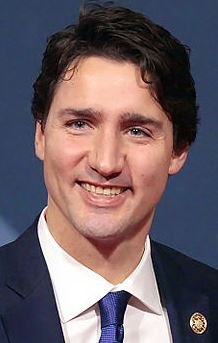 The Canadian Prime Minister Justin Trudeau is doing his best to send Canada into the Dark Age. He is clearly a Marxist and has targeted small business which creates 70% of all employment. He said “I want to be clear,” at the Liberal party’s recent caucus gathering in Kelowna. “People who make $50,000 a year should not pay higher taxes than people who make $250,000 a year.”
The Canadian Prime Minister Justin Trudeau is doing his best to send Canada into the Dark Age. He is clearly a Marxist and has targeted small business which creates 70% of all employment. He said “I want to be clear,” at the Liberal party’s recent caucus gathering in Kelowna. “People who make $50,000 a year should not pay higher taxes than people who make $250,000 a year.”
These people who always seek to run governments have ZERO real world experience and totally fail to understand the economy no less how society functions. They believe that they can just decree some law and everything will function to the desires.
Trudeau has been defending the his outrageous tax increase on small business that will impose double taxation as owners will no longer be able to pay themselves dividends, neither will they be able to sprinkle income among family members, or holding certain investments — such as real estate — through a corporation.
The Hunt for Taxes in Canada is in full swing. This is only part of the economic decline we see coming into play starting in 2018.
….also from Martin:












